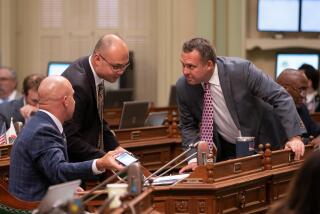Corporate Ally Helped Few Workers in Kerry’s State
- Share via
WASHINGTON — Massachusetts Sen. John F. Kerry said last week that he was fighting for jobs in his home state when he wrote 28 letters in support of a San Diego defense contractor and campaign contributor. But only six jobs in Massachusetts were ever at stake, the engineer in charge of the project said Saturday.
“At its peak, there were perhaps five or six people” dedicated to a federal missile project, said Richard Chedester. “It wasn’t a huge program.”
He was the chief technology engineer for Millitech when the Northampton, Mass., company was working on a guided missile system being developed by Science and Applied Technology in San Diego in the 1990s.
Kerry’s campaign staff said Saturday that the senator’s efforts to free up federal funding for the program were consistent with his goals in Congress: to help small businesses and promote new technology.
“If John Kerry goes to bat for one job in Massachusetts, that’s going to bat for jobs,” said Michael Meehan, a senior advisor to Kerry’s presidential campaign.
When asked about why he was lobbying for a program that would only provide six jobs to his district, Kerry insisted Saturday that 80 jobs were at stake in Northampton.
Millitech employed a total of 80 people.
“I don’t think there’s a person in Congress who hasn’t worked to try to grow a specific program or a specific effort that they believe in, that they think is worthy of the defense system of our country,” Kerry said. “I do it on the merits. I’ve always done it on the merits.”
Questions about Kerry’s lobbying efforts emerged last week when The Times reported that he participated in a letter-writing campaign from 1996 to 1999 to free up federal money for a missile program being designed by Parthasarathi “Bob” Majumder and his employees.
Kerry received about $25,000 from Majumder and his employees from 1996 to 1998, much of it illegally reimbursed to the workers.
Majumder, the former owner of Science and Applied Technology, pleaded guilty this month to funneling campaign contributions to Kerry and four other congressmen. Federal prosecutors said the lawmakers did not know the money was tainted.
Kerry, the Democratic presidential front-runner, has said he has never been swayed by special interests or campaign contributions.
In television interviews with CNN and PBS last week, he said his actions on behalf of the missile program had nothing to do with the contributions.
“Look, I fought for jobs in Massachusetts,” he said on CNN’s “Inside Politics.” “Every person in the United States Senate and Congress fights for their state and there are people who support them for those reasons, obviously.”
Chedester said the missile program never meant much money to Millitech, which has since been sold and is no longer involved with the program.
“The company didn’t really care,” he said. “I was only doing the job because it was technically challenging. The only reason we had the job was because of my hard work.”
Although Kerry’s office had referred to Millitech as Majumder’s “Massachusetts partner,” Chedester said the company had just 1% of the contract. During the 1990s, Science and Applied Technology was paid more than $150 million by the federal government to work on the project.
While Kerry became interested in the livelihood of the missile program, Millitech’s main focus was on the emerging broadband wireless access market.
Other former Millitech employees said they did not remember dealing with the senator.
“I don’t remember Kerry’s name,” said Debra Windoloski, who was the assistant to Millitech’s CEO during the senator’s lobbying efforts on behalf of the missile program.
She said she reviewed all correspondence and never saw anything from Kerry or his staff.
Kerry’s campaign on Saturday said the Massachusetts aspect of the contract was not the only reason he became so interested in the missile program.
Meehan said Kerry, a longtime member of the Senate committee overseeing small business, also wanted to aid the San Diego company because it was promoting innovative weapons technology at a time when only huge defense contractors could gain access to the Pentagon.
“The San Diego company started with a small business loan and grew as it went along,” Meehan said.
Kerry visited Majumder’s firm in 1998, former employees said, and attended a fundraiser there.
Majumder told his employees that “the company’s existence depended on his ability to raise federal campaign contributions,” court records state. He reimbursed them with proceeds from his government contracts, which is illegal.
SISCorp, a Washington lobbying firm owned by Francis Shottes, also aided Majumder’s firm.
On its website, the lobbying firm takes credit for adding $127 million over four years to the defense appropriations bill “for an innovative technology developed by a small defense firm. The technology, originally resisted by the individual service, will significantly improve the ability -- and lower the risk while doing so -- to knock out enemy air defenses.”
A former Majumder aide said the description on the website matched their missile program. SISCorp registered with the Senate to lobby for Majumder’s firm and named SAT as one of its clients on its website.
Shottes and his wife contributed $4,000 to Kerry from 1996 to 1998. Records show correspondence between Kerry’s legislative office and SISCorp in 1999.
Shottes could not be reached for comment.
Throughout his campaign, Kerry has criticized the growing power of special interests in Washington. But that doesn’t mean he has never dealt with lobbyists, Meehan said.
“We’re not ever claiming that lobbyists don’t contact Sen. Kerry’s office,” he said. What Kerry is saying, he said, is that “his vote is not bought.”
Chedester, the Millitech engineer, said he believed that any contact the firm had with Kerry came through the Washington lobbyists.
“Unfortunately, isn’t that the way Washington operates?” he said.
Majumder, who also was charged with lying about his background by falsely claiming he had a PhD in physics from the University of Maryland, sold his firm after the federal investigation began. The missile program remains under contract with the Pentagon.
*
Times staff writer Matea Gold contributed to this report.
More to Read
Inside the business of entertainment
The Wide Shot brings you news, analysis and insights on everything from streaming wars to production — and what it all means for the future.
You may occasionally receive promotional content from the Los Angeles Times.










